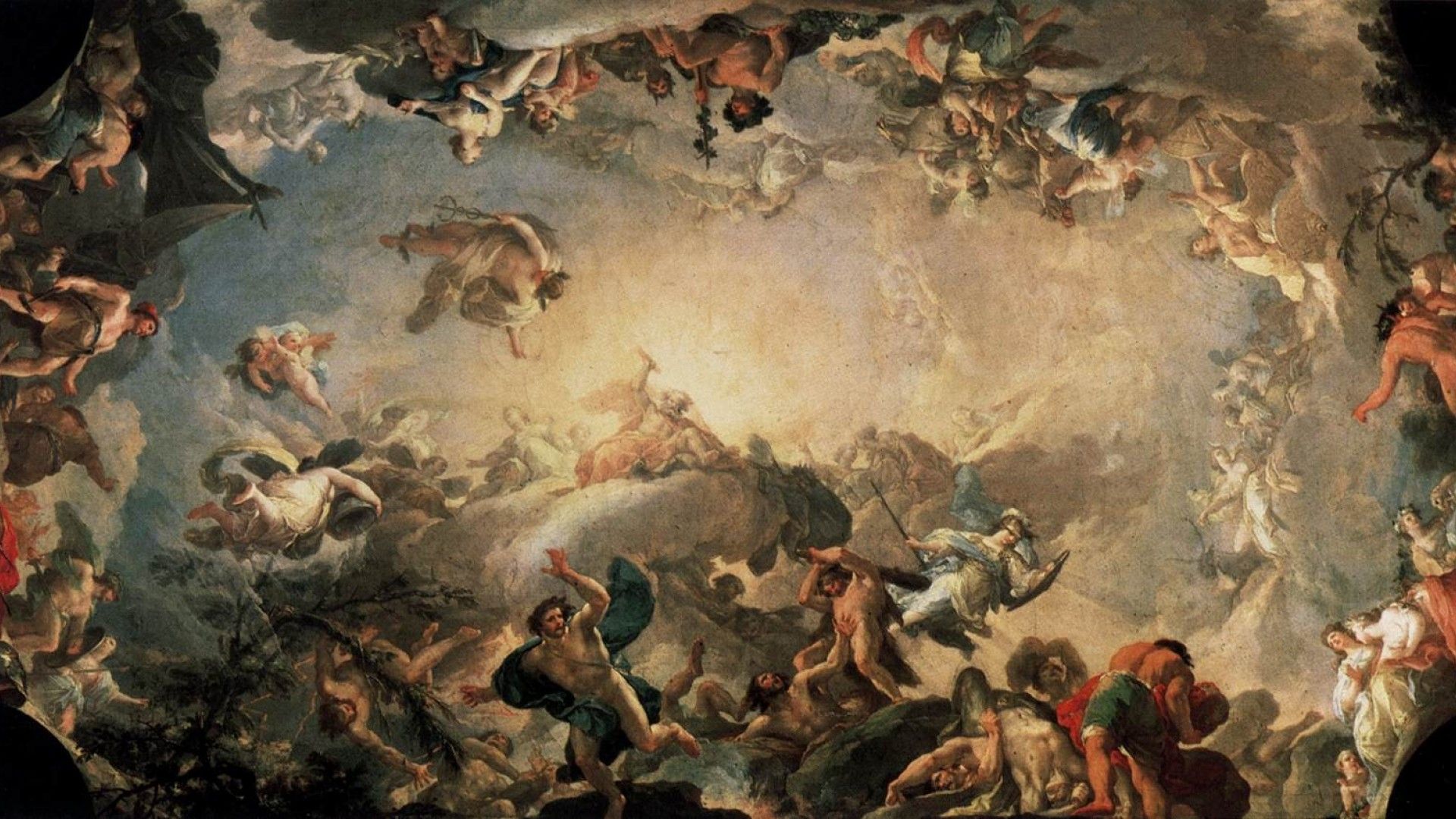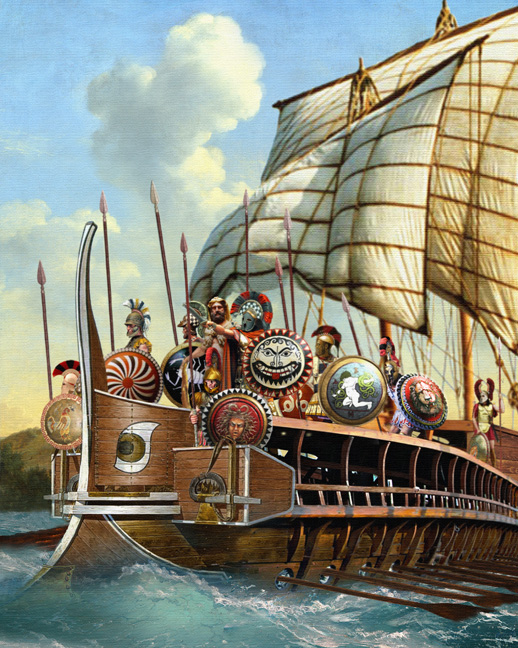
Argonauts

In Greek mythology, the Argonauts were a band of heroes who sailed with Jason in his quest for the Golden Fleece (see at the end for the names of the Argonauts). Their journey took them through numerous adventures and required the help of many different gods. Among the Argonauts were the sons of kings and of gods.
According to some sources, one of the Argonauts was a woman, the huntress Atalanta.
The Quest for the Fleece
Jason was the son of Aeson, the rightful king of Iolcus. When Aeson was overthrown by his brother Pelias, he sent Jason to be raised by the wise centaur Chiron. Later Jason returned to Iolcus to claim the throne. Pelias agreed to give it to him if he first found and brought back the Golden Fleece from Colchis - which Pelias knew to be an almost impossible task.
The Golden Fleece was the hide of a golden ram sent by the gods to save Phrixus and Helle, two royal children of the land of Iolcus whose lives were threatened by their stepmother. As the ram carried them to safety, Helle fell into the sea and drowned. The area where she fell (the Dardanelles in present-day Turkey) became known as Hellespont. Phrixus reached Colchis safely. There he sacrificed the ram to the goddess Hera, his protector. The fleece was hung on a tree in a sacred grove and guarded by a serpent that never slept.
The Call for Heroes. Jason ordered a ship, the Argo, to be built and sent messengers throughout Greece asking others to join him in his quest for the Golden Fleece. After assembling a group of 50 heroes, Jason set off. The Argonauts' first adventure was on the island of Lemnos, which was populated only by women. As a result of a dispute between husbands and wives, the women had killed all the men. The women received the Argonauts with great hospitality, and the heroes began to forget their quest. One of the Argonauts stood firm, however. This was Hercules (Heracles), a hero known for his strength. Hercules persuaded the other Argonauts to return to the ship.
In another adventure, Hercules defended the ship against six-armed giants who attacked while the others were on land. Later, in a rowing contest, Hercules broke his oar. While cutting wood for a new oar, his squire was kidnapped by a water nymph. Hercules went in search of the boy and, eventually the boy, was left behind by the Argonauts.
When the heroes stopped at the land of the Bebryces, the king, Amycus, challenged them - as he did all visitors - to a fight to the death. Pollux, the son of Zeus, took up the challenge and killed Amycus.
The Argonauts then stopped to see Phineus, the blind king of Thynia. Phineus was a prophet, and the travelers needed advice on how to proceed. Phineus agreed to help them if they would rid him of the Harpies, fierce, part-woman, part-bird creatures who stole and spoiled his food. Jason ordered a feast to be prepared. When the Harpies arrived to ruin the feast, two of the Argonauts-Calais and Zetes (winged sons of Boreas, the North Wind) - pursued them. Eventually, Zeus sent a message that the Harpies should be spared but that they should leave Phineus in peace.
After reaching the entrance to the Black Sea, the Argonauts had to go through the Symplegades. These were huge rocks that crashed together and destroyed any ship that tried to sail through them. Following Phineus's advice, the Argonauts released a dove and watched its course as it flew between the rocks. The dove made the passage, losing only a single tail feather.
As soon as the rocks began to come apart, the Argonauts pulled hard on their oars, following the path of the dove. When they had almost passed through, a great wave held them back. At that point, the goddesses Athena and Hera gave them a push, and the ship made it to safety. Forever after, the Symplegades remained separated.

Help from Medea. After more adventures, the Argonauts finally reached Colchis. Jason and several companions went to the court of King Aeetes to request the Golden Fleece. The first to see Jason was Medea, the king's daughter. Aphrodite (Venus), the goddess of love, made her fall in love with Jason. Medea was a witch and could help him with the difficulties ahead.
Aeetes had no intention of handing over the Golden Fleece, but he pretended to agree if Jason could pass several trials. Jason was to yoke two fire-breathing bulls to a plow and sow a field with dragon's teeth. The teeth would yield armed men whom Jason would then have to kill. Medea gave Jason a magic ointment that he rubbed on himself to protect him from the fiery bulls. Next she told Jason to throw a boulder in the midst of the soldiers to confuse them and make them fight one another. Then he would have to fight only the survivors. Following her directions, Jason succeeded in defeating the warriors.
Aeetes told Jason he would hand over the Fleece the next day, but Jason and Medea did not believe him. Promising to marry her, Jason once again obtained Medea's help. That night, she led him to the sacred grove and put the serpent to sleep with her magic. Jason then took the Fleece and with Medea and the Argonauts set sail across the Black Sea.
The Return Home
Accounts of the Argonauts' journey home vary. According to the writer Apollonius, Medea's brother Apsyrtus blocked the mouth of the Black Sea so the Argonauts had to find a different route for returning to Iolcus. Several versions of the legend agree that the heroes crossed the Black Sea to the Danube River. After sailing up the Danube, they traveled along various rivers and seas before reaching the Mediterranean Sea.
Some sources say that the Argonauts went north to the Baltic Sea; others relate that they followed the Rhine River to the Atlantic Ocean or that they reached the Adriatic Sea. At the entrance to the Adriatic, they met Apsyrtus, who tried to convince Jason to give up Medea. Jason refused and killed Apsyrtus.
The Argonauts sailed up the Po River and down the Rhone. Having almost reached Greece, the Argo was blown off course to Libya. There a great wave stranded the crew in the desert. On the advice of the gods, the Argonauts carried the ship across the desert until the sea god Triton helped them launch it back on the Mediterranean.
As they sailed past the island of Crete, Talos, the bronze man appointed by King Minos to protect the island, threw rocks at the Argonauts. Medea killed Talos with her witchcraft. The Argonauts' adventures continued. Nearing Greece, the ship was enveloped in a darkness so great that they lost their way. Apollo sent a blazing arrow that showed them the way to an island where they could wait until the light returned.
At last, the Argo arrived home in Iolcus (Thessaly, today: near the city of Volos).
Jason found Pelias, presented the Golden Fleece to him, but Pelias was still unwilling to give up his land. So Medea put a spell to Pelias to sleep and convinced his daughters that her father had died. In order to return to life, they were advised to cut him to pieces and boil- and so they did. Without knowing, they killed their father all by themselves.
Jason and Medea lived happily together for 10 years, when Jason fell in love with Glauce, a princess of Corinth. When Medea found out about her husband's affair, she killed all her children and then fled from Thessaly. Jason grew old lonely and in the end he killed himself by falling from the stern of the Argo.
The Argonauts were held in great honor throughout Greece, and many noble families later claimed to be descended from them.
The crew of the Argo
There is no definite list of the Argonauts. H.J. Rose explains this was because "an Argonautic ancestor was an addition to even the proudest of pedigrees". The following list is collated from several lists given in ancient sources (see below):
Acastus, Actor (son of Hippas), Admetus, Aethalides, Amphiaraus, Amphidamas, Amphion (son of Hyperasius), Ancaeus (son of Poseidon), Ancaeus (son of Lycurgus),
Areius, Argus (builder of Argo), Argus (son of Phrixus), Ascalaphus, Asclepius, Asterion (son of Cometes), Asterius (brother of Amphion), Atalanta,
Augeas, Autolycus (son of Deimachus),
Bellerophon, Butes,
Calais (son of Boreas), Caeneus (son of Coronus), Canthus, Castor (son of Tyndareus; twin and half-brother of Pollux), Cepheus, King of Tegea, Clytius (son of Eurytus), Coronus (son of Caeneus), Cytissorus,
Deucalion of Crete,
Echion, Eribotes, Erginus (son of Poseidon), Erytus (brother of Echion), Euphemus, Euryalus, Eurydamas, Eurymedon (son of Dionysus), Eurytion, Eurytus (son of Hermes),
Heracles (son of Zeus), Hippalcimus, Hylas,
Idas, Idmon, Iolaus (nephew of Heracles), Iphitos,
Jason,
Laertes (Father of Odysseus), Laokoon (half-brother of Oeneus and tutor of Meleager), Leitus, Leodocus, Lynceus,
Medea (joined when the Fleece was recovered), Melas, Meleager, Menoetius, Mopsus,
Nauplius, Neleus (son of Poseidon), Nestor,
Oileus, Orpheus,
Palaemon, Palaimonius (son of Hephaestus), Peleus, Peneleos, Periclymenus (grandson of Poseidon), Phalerus, Phanus (brother of Staphylus and Eurymedon),
Philoctetes, Phlias (son of Dionysus), Phocus, Phrontis, Poeas, Prias (brother of Phocus), Pollux (son of Zeus), Polyphemus,
Staphylus,
Talaus, Telamon, Thersanon (son of Helios and Leucothoe), Theseus (son of Poseidon and slayer of the Minotaur), Tiphys,
Zetes (son of Boreas)
Several more names are discoverable from other sources. Amyrus, eponym of a Thessalian city, is given by Stephanus of Byzantium as "one of the Argonauts"; he is otherwise said to have been a son of Poseidon and to have given his name to the river Amyrus. Azorus was the helmsman of Argo according to Hesychius of Alexandria; he could be the same as the Azorus mentioned by Stephanus as founder of the city Azorus in Pelagonia.
Further Sources
"Myth Encyclopedia"
"Greek Gods Info"
"Rose, A Handbook of Greek Mythology (New York: Dutton, 1959), p. 198"
"Stephanus of Byzantium s. v. Amyros"
"Scholia on Apollonius Rhodius, Argonautica, 1. 596. The Argonauts are reported to have sailed past this river by both Apollonius (1. 596) and Valerius Flaccus (2. 11)"
"Hesychius s. v. Azoros"
"Stephanus of Byzantium s. v. Azoros"
"Apollonius Rhodius, Argonautica, 1. 23 - 228"
"Pseudo-Apollodorus, Bibliotheca 1. 9. 16"
"Hyginus, Fabulae, 14"
Our Mobile Application
Check out Our Mobile Application "Ancient Greece Reloaded"


